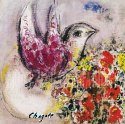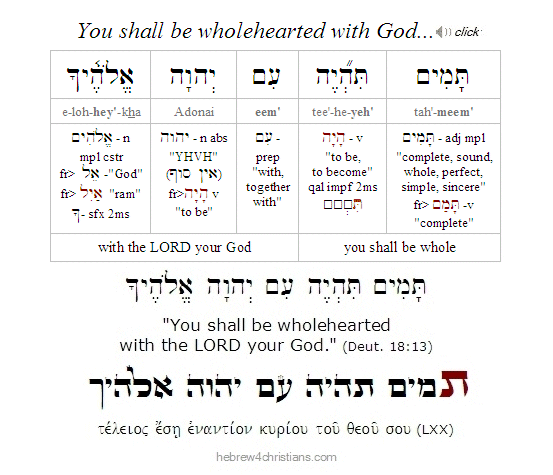|
From our Torah reading this week (Vayikra) we read: "When any person of you (mikem) brings an offering to God..." (Lev. 1:2), upon which the midrash comments: "Why does the text state 'mikem," translated "of you"? Because from this we derive that whoever recites one hundred blessings a day is as if he or she offered sacrifice. And how do we know this? From the Hebrew word mikem (מִכֶּם), which has a numerical value of 100: Mem + Kaf + Mem" (Yalkut Ma'ayan Ganim). The midrash attempts to connect the practice of "making a blessing" over the various moments of our day (arising, bathing, eating, drinking, etc.) with that of sacrifice, suggesting that the essence of sacrifice is gratitude...
Some of the sages have likened "making a blessing" to requesting God for permission to partake of the goodness of His world. Offering thanks "opens the world" to the Divine Presence, which in effect, sanctifies our experience. When we slow down and savor the moments of life, we will become more aware, more sensitive, and more receptive to the miracle of what is given... "The "sacrifice of praise" will flow from us spontaneously as we contemplate the peaceful glory of a sunset, listen to the song of a bird, smell the scent of a strawberry, or sit around the table with family or friends (*). In this way we become a "living sacrifice" as we walk in gratitude and love (Eph. 5:2; Heb. 13:15).
The Scriptures counsel us to be transformed by "renewing our minds" (Rom. 12:2), though how we are to do this remains an open question. Our perspectives and attitudes are shaped by our assumptions about life, many of which are "preconscious" or hidden from our awareness. Habitual thoughts, biases, prejudices, fears, etc., all affect (and distort) the way we see and understand reality. In light of this, how can we change? How can we overcome our habitual negativity, misery, and general unhappiness? How do we develop right thinking power? How do we learn to apply our minds to perceive the good, instead of responding in unreflective and negative ways to our circumstances? How do we discipline our will so that "if there is anything worthy of praise, think about these things" (Phil. 4:8)?
There are innumerable books on the subject of logic, detecting fallacies, and using sound reasoning techniques, but there are not many that discuss the "morality" of our thinking, that is, our God-given responsibility to perceive the truth and to consistently express it in our everyday actions. Since our thinking invariably leads to practical choices, we have a primary duty to know the truth and live out its implications in our lives. The failure to do so is not only inconsistent, logically speaking, but immoral, ethically speaking (and dangerous, spiritually speaking, since bondage is ignorance of the truth). If the truth bears witness that there is a personal God who creates each soul in the world, for instance, this should affect how we value and respect others, and the failure to do so will result in cognitive dissonance and internal contradiction that yields mental suffering, misery, emotional pain, and insecurity in our lives. A "double-minded" person is "two-souled" (δίψυχος), unstable (i.e., ungrounded, restless, unbalanced) in all his ways (James 1:8).
Healing comes from receiving the light of truth, being "single-minded," with our eye focused on what is real. "If your eye is "single" (i.e., ἁπλοῦς, sincere, focused)," Yeshua said, "your whole body will be filled with light" (Matt. 6:22). Likewise the Torah commands: "You shall be made whole (i.e., tamin: תָּמִים) with the LORD your God" (Deut. 18:13). We are made "whole" or "perfect" (i.e., complete) when we resolutely turn to God for healing of our inner dividedness, as it says: "The Torah of the LORD is perfect (תָּמִים), returning the soul" (Psalm 19:8). And where it is written, "Let us hear end of the matter: Fear God and love his commandments, the text adds: ki zeh kol-ha'adam (כִּי־זֶה כָּל־הָאָדָם), "for this is the whole man," suggesting that those who return will be healed of double-mindedness (Eccl. 12:13). Ultimately we are made whole when we are united to God in Messiah, for then we are "with the LORD our God" and the Spirit writes Torah within the heart of faith (Jer. 31:33).
The heart of truth sees beyond the present to find meaning in the Eternal, yet it refocuses on the present to endow it with sacred significance... "Love hopes all things" (1 Cor. 13:7). To rightly see the present moment, in other words, we must first look to the Eternal, since that grounds our perspective and contextualizes our hope: "For this light momentary affliction is preparing for us an eternal weight of glory beyond all comparison, as we look not to the things that are seen but to the things that are unseen. For the things that are seen are transient, but the things that are unseen are eternal" (2 Cor. 4:17-18).
Regard this as a prophecy for your life: "You shall be made whole with the LORD your God." God's love heals the inner brokenness of our hearts. When we accept this, we discover that surrendering to God's will truly makes us "whole." "As many as I love, I reprove and correct: be zealous therefore, and turn. Listen! I stand at the door and knock. If anyone hears my voice and opens the door I will come into his heart and share a meal with him, and he with me" (Rev. 3:19-20). These are words of our Lord Yeshua, who speaks to those who "hear his voice." May you open the door of your heart; may you return to Him now...
Hebrew Lesson
Deuteronomy 18:13 reading (click):
Note (*): The phrase "sacrifice of praise" (θυσίαν αἰνέσεως) comes from the New Covenant Scriptures (i.e., Heb. 13:15), which is the term used in the ancient Greek translation of the Torah (i.e., the Septuagint) for the "thank offering" (i.e., zevach ha'todah: זבַח הַתּוֹדָה) that expressed gratitude to God for His salvation (θυσίας τοῦ σωτηρίου).
|



